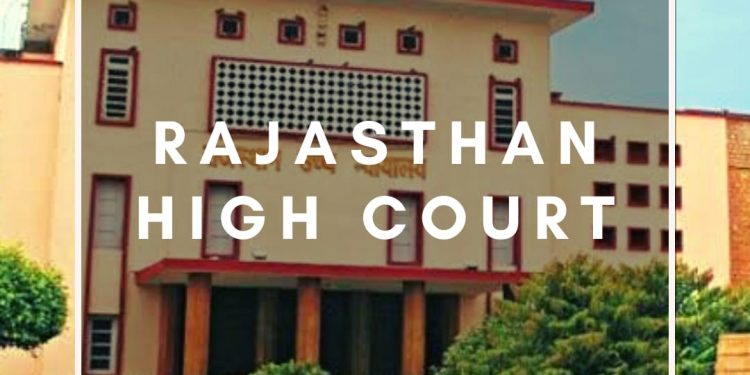The Rajasthan High Court recently quashed an FIR against the parents of an accused husband in an alleged dowry harassment case and other criminal cases. The high court was of the opinion that it was a “clear case of over-implication”, given that the in-laws did not ordinarily reside with the estranged couple.
Case:
Couple got married in December 2015 and later moved to Bangkok and stayed there after the marriage. The wife had visited her in-laws from time to time, but only stayed with them for a few days at a time.
However, thereafter, matrimonial conflict arose between the couple, which led to lodging of the present FIR dated June 2019 at Police Station Mahila Thana, Sriganganagar, District Srigangangagar for the offences under:
- Section 406 (punishment for criminal breach of trust),
- Section498-A (cruelty to woman/dowry harassment)
- Section313 (punishment for causing miscarriage)
- Section 377 (unnatural offences)
of the IPC
Submission by Husband, His Family
Learned Senior Counsel for the petitioners submitted that on a bare reading of the FIR itself, the offence against the present petitioner-husband is not made out. The Counsel for the petitioners further submitted that the offence is also not made out against the old aged and ill parents of the complainant’s husband, and the impugned FIR was lodged only with a view to harass them.
The Counsel also submitted that the role of the petitioners (in-laws of the complainant) cannot be said to be such, which can suggest that they were the perpetrators of the allegations concerned, as they were residing at Hanumangarh, whereas the complete matrimony in question was admittedly spent at Bangkok (Thailand), except for certain intermittent visits of the complainant-wife to her matrimonial home at Hanumangarh.
Defense by Respondent Wife
On the other hand, learned Public Prosecutor as well as learned counsels for the private respondents, including the complainant-wife, while vehemently opposing the petitions, submitted that since the nature of allegations levelled in the present FIR are very serious, therefore, at this stage, no interference of this Court under the inherent jurisdiction of Section 482 Cr.P.C. is warranted.
The counsels for the private respondents however, reiterated the story, as narrated in the impugned FIR, and the documents, pertaining to the investigation made into the present FIR, were also shown by the learned Public Prosecutor to this Court.
Rajasthan High Court
Justice Pushpendra Singh Bhati placed substantial reliance in the Rajasthan High Court ruling in Hari Ram Sharma & Ors. Vs. State of Rajasthan & Anr.
In the said case, the High Court had observed that it is not uncommon to implicate all immediate relations of the husband in matrimonial cases. Justice Bhati went on to recount that in Hari Ram Sharma’s case, the Court had concluded that,
If the couple was not residing with the in-laws and the focus of the allegations was upon the husband only, then it would not be proper to prosecute such family members, like the in-laws.
After factoring in certain WhatsApp conversations as well, the Judge concluded that the “retrospective allegations” against the in-laws only cropped up after there was matrimonial disharmony between the estranged husband and wife.
The Judge noted that the allegation against the In-laws were that they turned the wife out of their house, that they induced the wife into the marriage on wrongful facts, and thereafter, kept on making the demands of dowry.
However, the court noted that these allegations were “sporadic and very vague”, since no specific incident was mentioned in the FIR.
The Rajasthan High Court went on to conclude,
The implication of the old aged and ill in-laws by the present complainant-wife is nothing but an expansion of the matrimonial dispute with an ulterior motive to exert unnecessary pressure upon them.
The judge observed that even if the complaint was taken on face value, it indicates that the complainant-wife never resided with her in-law, except for short visits. The court added that the allegations, prima facie, stood primarily against her husband and not the in-laws. The high court also remarked,
This Court is also of the opinion that the long distance relationships, on the face of it, cannot cover the allegations levelled in the FIR in question against the in-laws. Thus, though the allegations levelled in the FIR against the accused petitioner- husband may be genuine, but the same, as levelled against the petitioners/in-laws, at the threshold itself, are nothing but a pure abuse of the process of law.
Thus, the case against the in-laws was quashed, while the case filed against the husband was not interfered with.
ALSO READ –
Delhi Court Acquits In-Laws In False Dowry Harassment Case | Grants Rs 10,000 Compensation After Suffering Trial For Several Years
Man Commits Suicide After Wife & In-Laws Threaten To Book Him In Dowry, SC/ST Case If He Didn’t Pay Rs 15 Lakh
Supreme Court Cuts Short Jail Term In Dowry Case As Husband Agreed To Pay Compensation
Senior Citizen Couple Ends Life Due To Alleged Constant Harassment & False Dowry Cases By Daughter-in-Law
2016 | Jharkhand Police Ties Woman With Rope After Sister-in-Law Accuses Family Of Dowry Harassment
ALSO READ –
NRI Husband Speaks About False Dowry Harassment Cases Despite Him Spending On In-laws Everytime
Join our Facebook Group or follow us on social media by clicking on the icons below
Join our Facebook Group or follow us on social media by clicking on the icons below
If you find value in our work, you may choose to donate to Voice For Men Foundation via Milaap OR via UPI: voiceformenindia@hdfcbank (80G tax exemption applicable)































